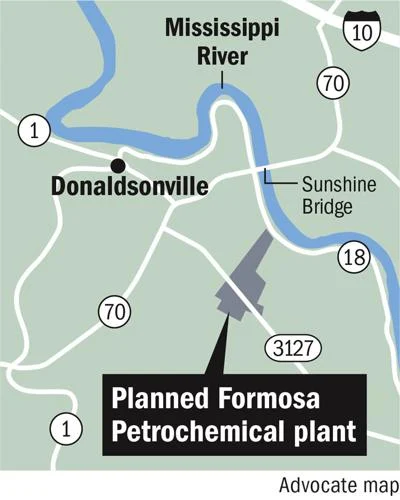the plot of our undoing

Ande & Eje
V: @flowwithday
C: $flowwithday
Hit them up on Instagram (@flowwiththeday) with any leads for COVID-safe housing in Los Angeles
Tamir (needs to meet his goal by Friday 8/4)
V: @sunboywonder
C: $sunboywonderr
Amanda
V: @Amanda-Seigel
C: $snakeskinfin
Paypal: @AmandaSeigel
GoFundMe: gofund.me/d89685ed ($1728/5000)
Tea
V: @blacklikemagic
C: $blacklikemagic
Book them for a tarot reading: blacklikemagic.com/
the plot of our undoing
the story of the last several months as told through land & the earth
Miriam Makeba - A Piece of Ground
alt text provided for images
we're well on the other side of the summer solstice, but i'm still processing the spring and the moments since that have led me here. i'm still metabolizing what it meant for my body to readjust after bracing against pain for months with few answers, what it meant to feel more lively as the earth awakened into its own verdant renewal, what it meant to mark my 18th year calling Georgia my home.
one of the first times i could comfortably make a walk to the end of my street this spring, i noticed honeysuckles blooming above the creek-bottomed ravine i used to scurry down into all those years ago when we first moved here. i stopped to bend my nose to the delicate yellow and white chalices, and the scent transported me to my first spring here.
one bright day, my new classmates pointed out the honeysuckle threading the chainlink fence behind the kickball diamond. i watched them as they expertly pinched the petals apart from the stems before sampling the drops of nectar on their ends. i mimicked them soon after, and i was immediately delighted with the sunspots of perfumed sweetness erupting on my tongue. we drank and discarded dozens of the flowers before our attention spans (or the recess-ending whistles) called us elsewhere.
this memory came alive once again as i stopped to smell the flowers all these years later, and my taste buds lurched at the possibility of trying the honeyed ambrosia once again. more restrained this time around, i plucked only one bud from its leafy home, hopeful to recreate that golden magic. unfortunately, lack of practice / a sense of hurry (thanks to a lingering car) / stiff finger joints all collided clumsily around my attempts to unsheathe the stems, so there was nothing to taste when i stuck the tendrils between my lips. i felt no disappointment though. it was miracle enough to have regained enough mobility to be greeted with a bouquet of recollection.
this spring, it was near-impossible for me to plant in our backyard (i could barely hold a pen or read tarot for myself), but i found other ways to learn from/about the earth, root myself in creative practices, and embrace opportunities to be held by new and familiar grounds. as someone who has moved around several times while feeling an undeniable pull to my lineages in faraway lands, it's been (and will continue to be) a lifelong journey to figure out how to anchor myself in one homeplace so i can make more intentional efforts towards being in right relationship.
APRIL
i finished my gig with the Sierra Student Coalition*, which lent me an opportunity to further anchor my political education offerings within a climate justice framework. outside of bearing witness to various climate crises and coming to my own personal conclusions about the state of the world, i had the SSC as an outlet to more critically cultivate my environmental justice politic. with all of the Sierra Club's imperfections, the SSC Sprog was an oasis in the chaos. my time with them culminated in us going to Bvlbancha/New Orleans for the Power Shift Convergence*. i got to meet the folks on my team in person for the first time, and learned a lot about New Orleans-specific land-based struggle while there.
in the first session i attended -- "Cancer Alley: Resistance in Louisiana from slavery to environmental racism" -- organizers from the Louisiana Bucket Brigade outlined the history of petrochemical pollution affecting the health and well-being of communities living along the 85-mile stretch of land between Baton Rouge and New Orleans. the overabundance of factories and refineries in the region has clear ties to the economy of enslavement. the plantations that once held enslaved people captive were sold to industrial overlords, which seamlessly paved the way for further exploitation of the land and endangerment of the Black people living on it. this transition didn't occur without a fight though. enter an under-sung narrative of rebellion: the incendiary 1811 Slave Uprising, a flashpoint in the region's timeline of resistance.
Led by Charles Deslondes, a slave believed to have arrived in Louisiana from Haiti, the revolt began on January 8 on Manuel Andry’s plantation near present-day LaPlace. Armed with pikes, axes, shovels, and a few rifles, the army of the enslaved began its two-day march in military formation down the east bank of the Mississippi River. Waving flags and beating drums, the rebels burned plantations, crops, and storehouses. As it marched on New Orleans, the army grew as slaves rushed out from the plantations to join the fight. Witnesses estimated that the army had grown to between two hundred and five hundred slaves.
- Paper Monuments, “The Enslaved Peoples' Uprising of 1811”
though this Uprising was violently quelled, it lived on in the spirit of the generations of Black folks who have lived in the region since. bringing it to recent history, the presenters shared how residents in the predominantly-Black area have had to take on another fight against extractive greed. the petrochemical giant Formosa Plastics was planning to break ground to build a $9.4 billion facility on land where enslaved people are buried in unmarked graves. (yet another way we can be desecrated as/by/for capital not just in life, but also potentially after death. ain't no rest because of the wicked, chile.)
through the wave of frustration and grief i felt upon learning this, i thought back to this episode of Zora's Daughters wherein the hosts unpack the connections across the different ways the word "plot" may be invoked, using Katherine McKittrick's and Sylvia Wynter's work as guidance.
"The plot is figuratively fertile ground for the creative and geographic plotting and plot living that produce plantation futures**. And so are present is the consequence of the plot and the plantation, a dichotomy that parallels creativity and survival and violence and domination, all of which created the conditions of possibility for black people in the Americas, in the present."
Zora's Daughters (S2E3), "600 Years a Slave"
plots of (stolen, haunted) land, plots as a narrative's guiding logic, plots as clandestine plans kept in confidence. from the 1811 uprising to continued defense of sacred land and life in Bvlbancha, the plot thickens, beckons, blackens. the burial grounds of unnamed souls remain untouched for now, due to the efforts of Cancer Alley residents, but Formosa Plastics still seeks ways to move ahead, scheming to subvert a judge's September 2022 ruling to strike down air permits for the cruelly-named Sunshine Project. as is to be expected, however, the people prepare plots of their own to keep surviving and protecting the land they call home.
the rest of the Convergence passed in an enlightening, exhausting blur. highlights included the session on Black people's fraught yet sacred relationship with water, the panel of Indigenous and Two-Spirit folks that included one of my inspirations Amber Butts (aka Melanin Mvskoke), and of course Imani Barbarin's and Akwaeke Emezi's respective keynote Q&As. (if those were highlights, the supernova moment was directly thanking Akwaeke Emezi for centering transness and indigenous African realities in their work + receiving a hug from them in return!!)
me and the homies decided to stay some extra days after the Convergence to celebrate Cie's birthday in style. being on our own time in Bvlbancha gave us the chance to connect more earnestly with the city and pointed us to time-spanning bastions of earthbound resistance/reclamation, from the Orisa chants we overheard at the first crossroads we encountered, to encountering an installation about maroon leader Jean Saint-Maló just up the path from #StopCopCity graffiti. no matter where i go, all roads -- paved with world-changing legacies -- point to home.
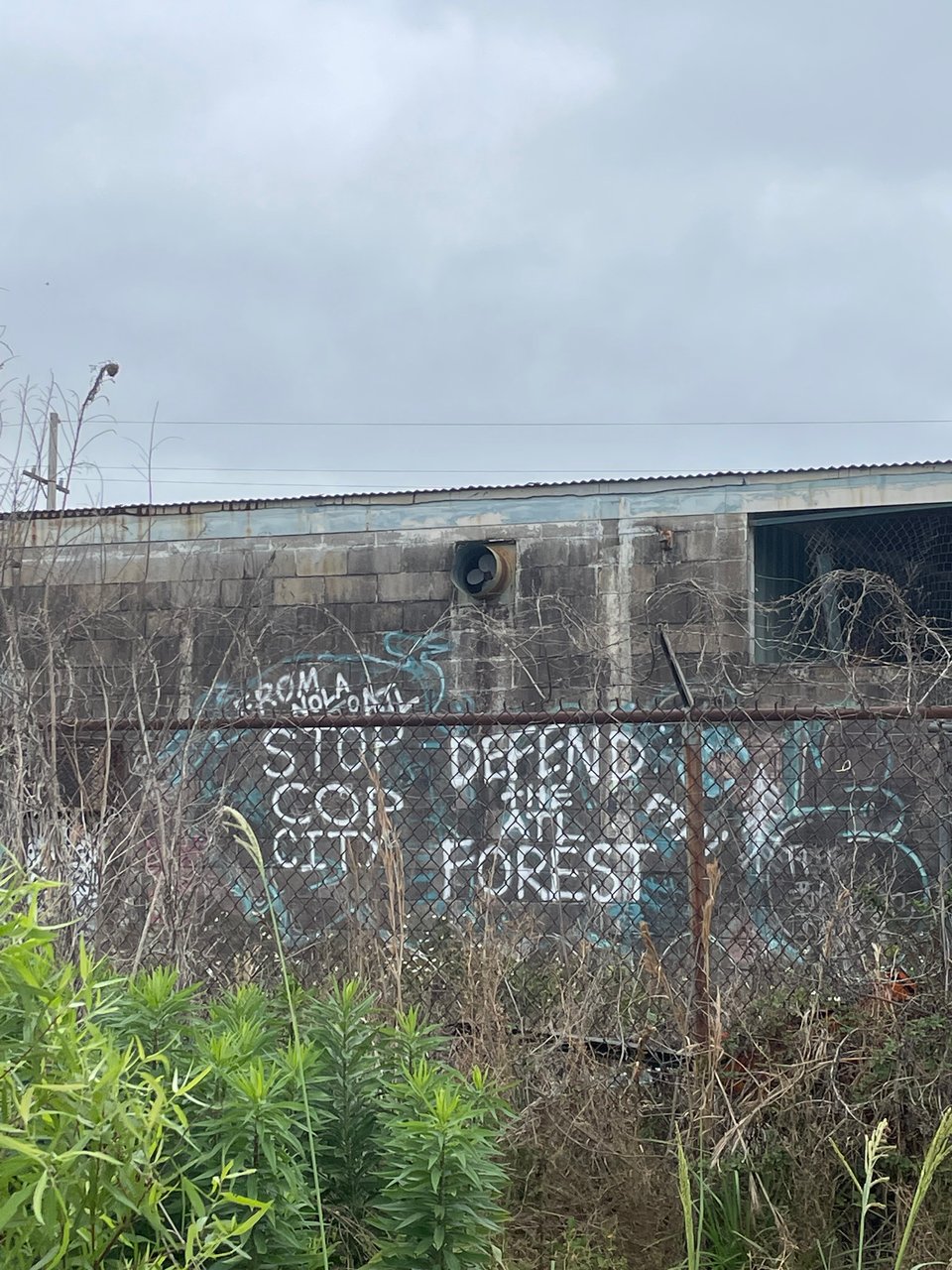
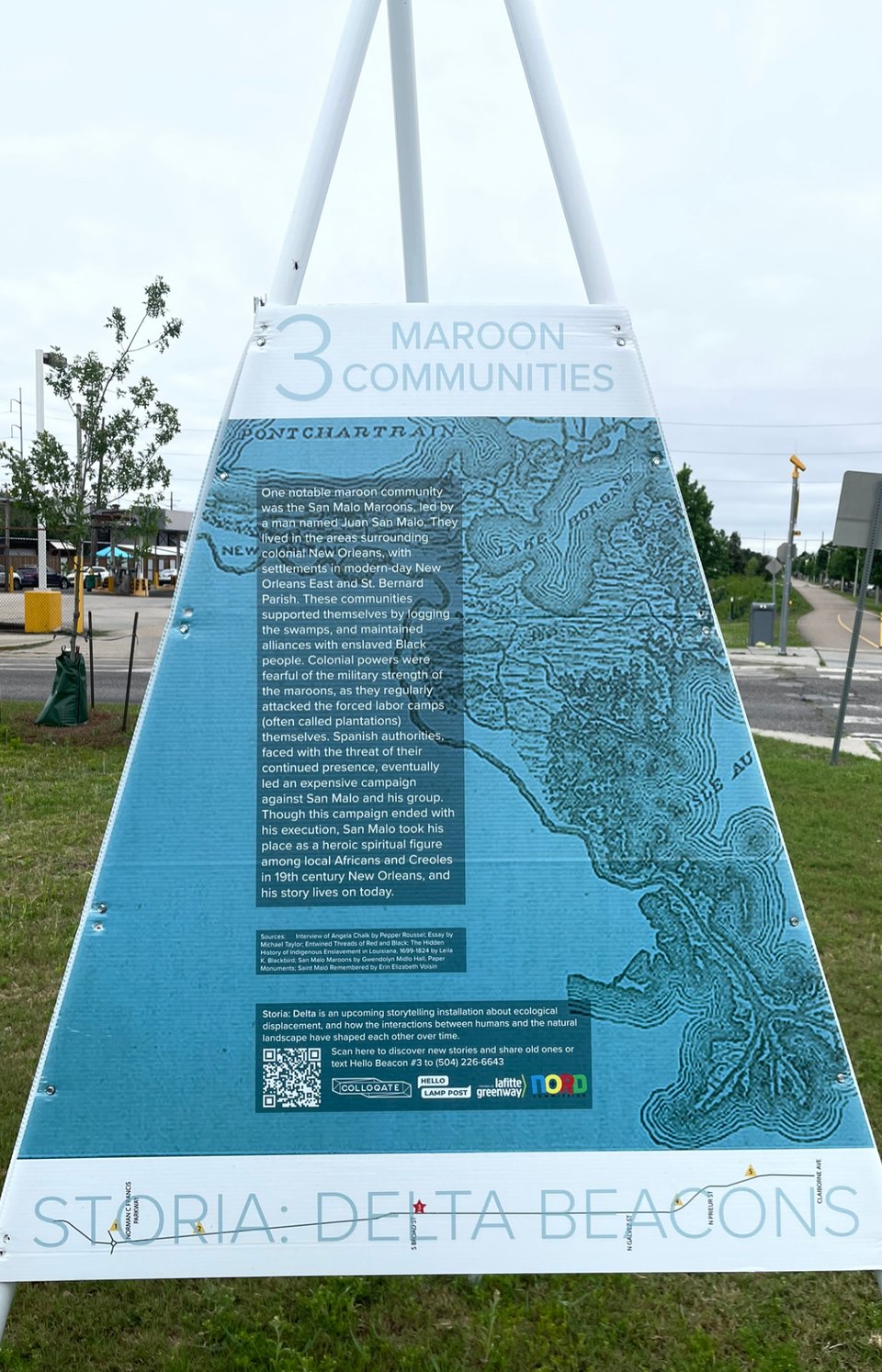
MAY
most of my place-based reflections this month were mediated through virtual experiences that i enjoyed within the four walls of my inner sanctum. on the first Sunday of the month, i attended a Disability Justice Mbongi: A Community Roundtable for Black Folks. facilitators aimed to foster "a greater understanding of how disability justice is aligned with Indigenous African practices of care, healing, and accountability."
we covered so many bases at the Mbongi, from each facilitator's individual experiences surviving under ableism and anti-Blackness, to Elmina Bell's Mulema Ngoma framework*** on "Activating Holistic Healing and Interdependent Communal Care Responsibilities with the Mentally and Physical Disabled," to a roundtable where we all got to air out our COVID-19-related grief. i was even lucky enough to meet another Black trans disabled person based in Georgia and make plans to connect more intentionally beyond that space.
then during the last weekend of the month, i completed a fellowship with The Southern Esesu Endeavor (SEE). this was a particularly exciting accomplishment for me because i submitted to participate in the poetry track, after taking a much-needed hiatus from writing poetry; it was deeply affirming to take a chance on myself and be accepted into this intracommunal space.
"We thought about our name for a long time, and we chose The Southern Esesu Endeavor because it encapsulates our African heritage with the specific concept and community practice of coming together with our gifts, our current geographic location as Southern American writers, and a sense of forward momentum in our writing practice."
though the experience was a few short days, i built my confidence in my craft tenfold and ensconced myself in a Black creative community willing to celebrate and challenge me.
of course, as much as i'm tethered to the South, my ties to the earth extend past Turtle Island. each fellow was tasked with facilitating 15-minute workshops on the topics of our choosing, so i created "Signed, Sealed, Delivered: The Epistolary Form As a Vehicle for Time-Bending & Memory-Keeping" wherein i cited June Jordan's "6.3.96 - 6.4.96," Ocean Vuong's "Someday I'll Love Ocean Vuong," The Color Purple by Alice Walker, and Dear Senthuran: A Spirit Memoir by Akwaeke Emezi as pieces that demonstrate the poetics of the epistolary form. working on this presentation while feeling an undeniable pull to the grounds of my lineage in Tobago inspired me to create my own example of an epistolary poem about meeting my maternal grandmother for the first time as she was dying from cancer, and how her children (excluding my mother) went against her final wishes, burying her in what's basically an unmarked grave in Scarborough instead of her home village of Castara. the plot anonymized, misplaced, buried without a trace. and yet, the plot, still remembered.
the following month, on the anniversary of her improper burial, i read the full poem for her at my altar, letting her know that shes "not forgotten/simply misplaced/everywhere except in memory." it's said that from the earth we came and to it we shall return, so until it is my time, i will carry the stories of my dead in my heart, my marrow, my flesh.
JUNE
down here, the month started with the State twisting the knife it plunged in our ribs by moving ahead with plans to fund Cop City, despite years of protests that gained considerable momentum since state troopers violently murdered forest defender Tortuguita. meanwhile, hundreds of miles north, wildfires consumed Canada, and smoke choked Midwestern and Midatlantic skies. reasonably, my despair bisected itself across the homes of here/now (Georgia) and there/then (New York and Ohio). no matter where i turned, i witnessed folks struggling to breathe.
exacerbated by capitalistic greed, the increasing temperature of the planet has demonstrably disastrous effects, making fires more "commonplace" occurrences in certain parts of the world, while others are subject to catastrophic flooding. what goes on in one part of the world will inevitably reverberate outwards. our ecosystems are inseparable. though two very different phenomena of environmental annihilation, the poor air quality (on top of a worsening viral pandemic) and the Cop City developments both made it clearer how illusory borders and human-made lines are, their own plots of contentious land.
the history of the Weelaunee Forest cannot be dismissed as its future hangs in the balance. once the site of a prison farm, this plot of land is part and parcel of Atlanta's carceral geography. though not "officially" proven through "legitimate" state records, it is widely believed that marked and unmarked graves rest where the prison farm used to operate.
To be perfectly clear, this burial ground is not on the property that’s up for lease; the tract of land that was originally the Prison Farm has been divided into many smaller pieces, and only one of those is currently being sought for lease by APF. However, what this tells us is that a) there is at least some truth to at least some of the folk histories, and b) the prison farm as a whole contained at least some unmarked graves, which leads us to believe the other claims are at least worth taking seriously.
- It's Going Down, "Slave Labor, Overcrowding, and Unmarked Graves: The Buried History of Atlanta’s Prison Farm from the 1920s to 1990s"
i can't help but ruminate on the land at stake in Cancer Alley, along with the land where my grandmother is buried. plots of meta/physical betrayal. the trees in the Weelaunee Forest already hold numerous stories of lived being unmade, displaced, hidden from view. their destruction would mean more stories to archive, more plots of undoing (word to Saidiya Hartman) at the behest of increasingly-militarized police.
The plot begins with the blackening of the world. With being brutalized, scorned, dishon-ored, and violated. With being cast out. It begins with the wall, with the electrified fence, with the surgical bomb, with the embargo, with the police helicopters and the military drones looking for all those out of place and on the run. It begins with a blunt instrument to the back of the head, with being unable to breathe, with refusing to put out her cigarette.
- Saidiya Hartman, "The Plot of Her Undoing"
"Cop City Will Never Be Built" reads the proverbial banner of resistance against City Council, the corporate funders, and the jackbooted pigs patrolling Atlanta. i resolutely sit under this banner, just as horrified by the prospect of this multi-million-dollar police terror project. still, the threat remains as the Weelaunee forest sits at the precipice of precedence. should this threat become reality, other major cities will very likely follow suit. case in point: organizers in Ohio had to turn up on state legislators to halt a study on the possibilities for creating a Cop City-like facility, and they were blessedly successful in their efforts.
in December of last year, Tortuguita did an interview as part of larger profile on the movement to defend the Atlanta forest, and they provided an eerily prescient answer when asked what success would look like. “'The abolitionist mission isn’t done until every prison is empty and there are no more cops.' They acknowledged they didn’t expect to live to see that. 'I smoke,' they said wryly.“ a month later, they took their last breaths under a hail of bullets, arms raised towards the treetops. this is the level of repression we're up against down here, and i'd bet money that the state's escalation will only worsen and diversify, if not through outright death, then through attempts to disappear people into prisons on domestic terrorism or RICO charges.
according to the book log i keep in my Notes app, i started reading Braiding Sweetgrass by Robin Wall Kimmerer the day before the Atlanta City Council pushed ahead to approve funding for Cop City. i like to believe spirit moved me to the pages, knowing i'd need to be anchored by indigenous wisdom in the days/weeks/months to come. each chapter damn near moved me to tears because of how palpable the author's reverence for the earth was.
From the very beginning of the world, the other species were a lifeboat for the people. Now, we must be theirs. But the stories that might guide us, if they are told at all, grow dim in the memory. What meaning would they have today? How can we translate from the stories at the world's beginning to this hour so much closer to its end? The landscape has changed, but the story remains. And as i turn it over again and again, Skywoman seems to look me in the eye and ask, in return for this gift of a world on Turtle's back, what will I give in return?
Braiding Sweetgrass by Robin Wall Kimmerer, page 8
Tortuguita's moniker was inspired by the Miami chief Little Turtle (mihšihkinaahkwa), who led indigenous forces into several victories against encroaching colonizers in 1790 and 1791 on land that we now know as Ohio. as key as the Stop Cop City vote may be in moving forward, how might other tactics of direct action and coordinated community defense manifest currently to beat back the forces striving to kill us in our own homes? what investments will we make to learn from and build solidarity with the Mvskoke, who have been making returns to their ancestral homelands from which the Weelaunee Forest grows? what stories (plots) have we to reclaim, to tell and till anew?
we have been given an irreplaceable gift. a home that nurtures and feeds us, and that will continue to do so if we feed and nurture it in turn. Robin Wall Kimmerer put it beautifully: "If all the world is a commodity, how poor we grow. When all the world a gift in motion, how wealthy we become." i definitely don't have any quick answers for how to stop the many fronts of extractivism and ecological degradation, but i know my entry points will be identified first through understanding, from my own ever-shifting capacity to the issues at hand in my own backyard. i'm letting my gratitude for the earth -- and the life it gives us -- guide me towards identifying what my duties are in these moments.
i'll end where i began: with honeysuckle. i noticed plenty weaving through the chain-link fence outside the Prideteenth function i went to with my friends. there's something fascinating about how i always see them transgressing human-made structures. nature knows no borders, after all. she defies containment. i left the buds alone this time and instead savored the sweetness of being surrounded by Black queer beloveds, the summer sun illuminating miracles upon miracles that deserve preservation. longevity. futures. my home beckons for me to find new narratives to spin, as we unmake ones forced upon us by centuries of enslavement and expulsion. thinking of the cyclical endurance of the flowers that welcomed me here, i prepare myself to answer the call.
The undoing of the plot does not start on bended knee, it does not begin with ballots or bullets, or with an address to the court, or with a petition, or with the demand for redress, or with the slogan: no justice, no peace. It begins with the earth under her feet. It begins with all of them gathered at the river and ready to strike, with all of them assembled in the squatter city, with all of them getting ready to be free in the clearing. They don’t say what they know: all things will be changed. The undoing of the plot begins with her runaway tongue, with her outstretched hands, with songs shared across the unfree territory and the occupied lands, with the pledges of love that propel struggle, with the vision that this bitter earth may not be what it seems.
- Saidiya Hartman, "The Plot of Her Undoing"
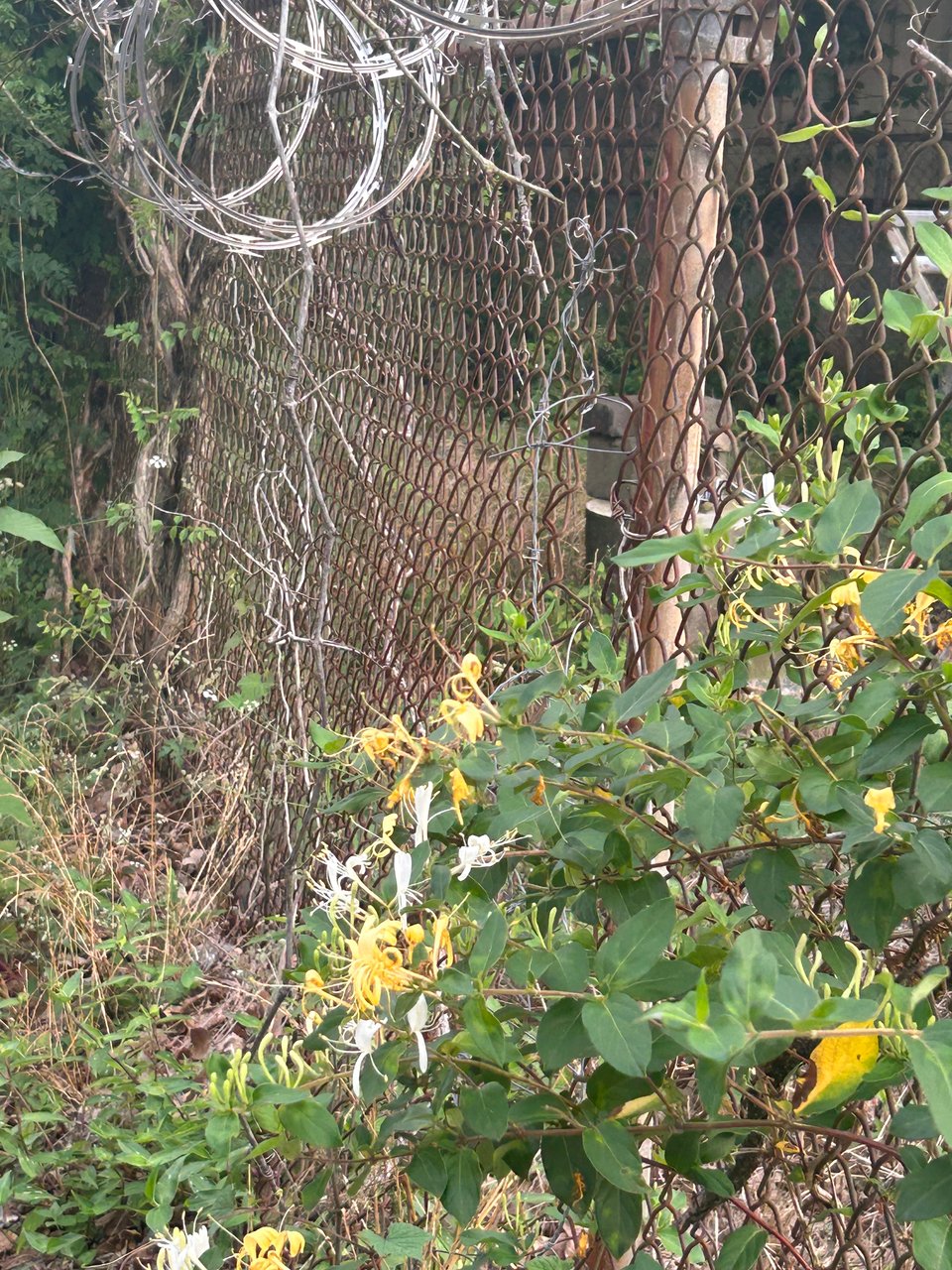
notes
*both the Power Shift Convergence (PSC) and the Sierra Club have been the center of some disappointing news since my involvement in them. it came out that the PSC furloughed much of their staff (who worked so hard to pull together the Convergence), refused financial transparency, and overall mismanaged the organization to the point of harming both staff and members. then not too long after that, the Sierra Club decided to axe the Summer Student Coalition, which was the main program within the Sierra Club working to serve and support young Black and Indigenous organizers and organizers of color. along with staff jobs hanging in jeopardy, this also meant that the Summer Program we were working so hard to revamp will no longer exist in the world. tldr: the non-profit industrial complex is a scourge masking itself as benevolent, and it pains me to know how many people were let down by organizations espousing liberatory and/or anti-capitalist politics.
** "The burial ground tells us that the legacy of slavery and the labor of the unfree both shape and are part of the environment we presently inhabit. It also points to the plot of land where the enslaved are buried and provides an opening for what I am calling here “plantation futures”: a conceptualization of time-space that tracks the plantation toward the prison and the impoverished and destroyed city sectors and, consequently, brings into sharp focus the ways the plantation is an ongoing locus of antiblack violence and death that can no longer analytically sustain this violence." -- Katherine McKittrick, "Plantation Futures"
***this disability justice gathering was for Black people only. if you're Black and curious about the specifics of Elmina Bell's framework, respond to this email and i'm happy to privately send U the link to their presentation!
references
Aja Arnold, "Muscogee (Creek) tribal members migrate to homelands 200 years after ancestors’ forced removal" (Mainline Zine)
Cierra Chenier, "Jean Saint Malo: The Man, Maroon, & Martyr" (Noir 'n NOLA)
Saidiya Hartman, "The Plot of Her Undoing"
Brian Hioe, "Formosa Plastics Likely to Resist Legal Ruling Against Sunshine Project" (New Bloom Mag)
Terry L. Jones, "Activists want $9.4B Formosa project stopped due to slave cemetery at St. James site" (The Advocate)
Sean Keenan and Rick Rojas, "Atlanta City Council Approves ‘Cop City’ Funding Despite Protests" (The New York Times)
Robin Wall Kimmerer, Braiding Sweetgrass
Paper Monuments, “The Enslaved Peoples' Uprising of 1811”
David Peisner, "The Forest for the Trees" (The Bitter Southerner)
Zora's Daughters (S2E3), "600 Years a Slave"
post-script
a short fiction piece i wrote earlier this year was accepted for publication! having found a home with Sistories Literary Mag's Issue III: The Hereafter, "talkin' bout heaven" was inspired by climate grief, a massive thunderstorm, and one of my favorite spirituals. head here, flip to pages 62-64, and feast your eyes.
i highly recommend reading the eviction notice that the Mvskoke people delivered to Mayor Andre Dickens and supporters of Cop City.
a spell for finding a future is a piece of writing i've revisited often ever since i first came across it in 2019 or 2020. i even included it in the curriculum i created with the Sierra Student Coalition since i thought it was necessary for any youth engaging with the content to have intentional space to process any climate or oppression-related grief they were carrying. hopefully it serves as a salve for U like it has for me.
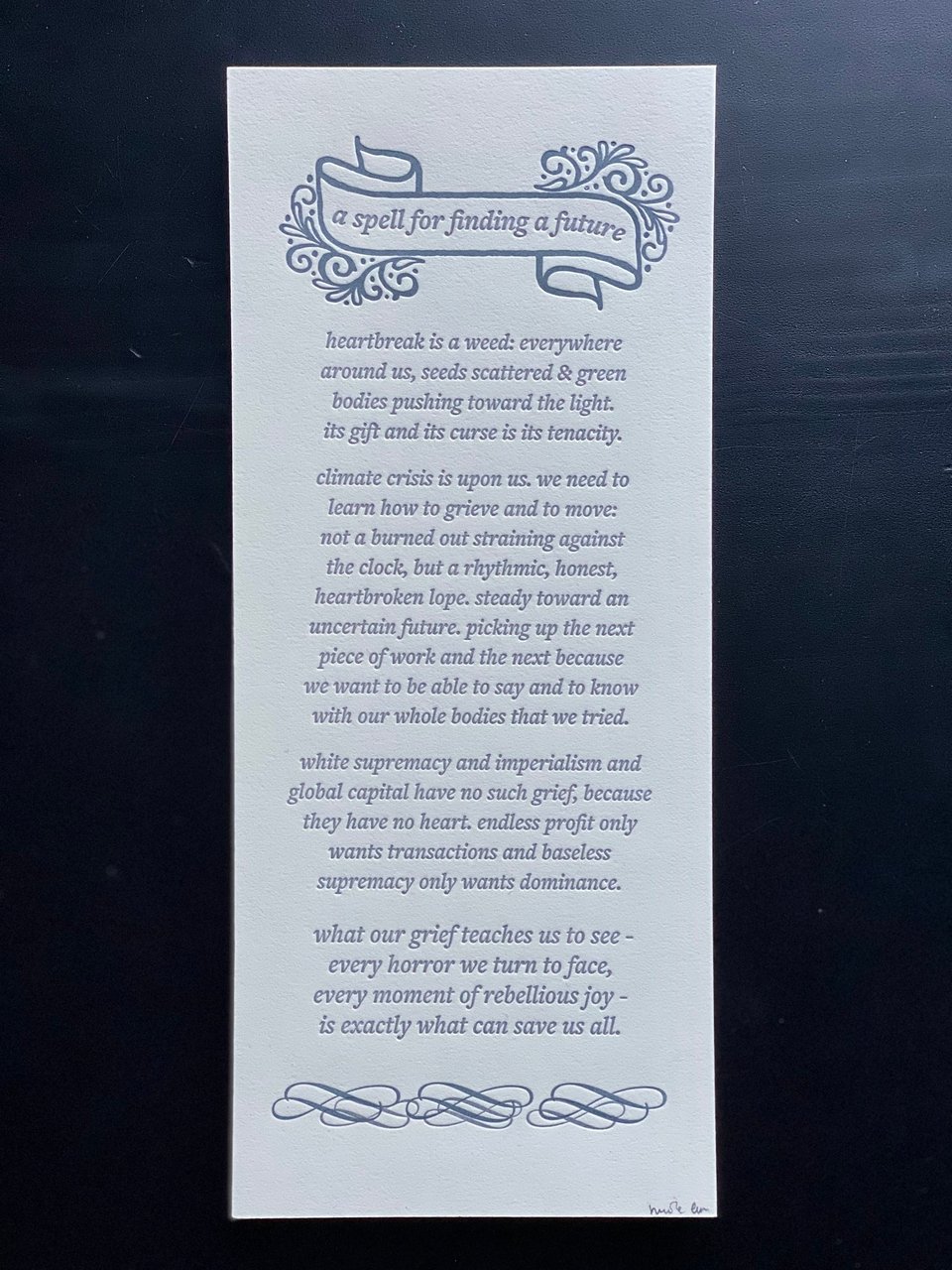
i'll catch U back here in some weeks for R2TS' Black August issue, Lord willin' and the creek don't rise.
bisous!
Dkéama
